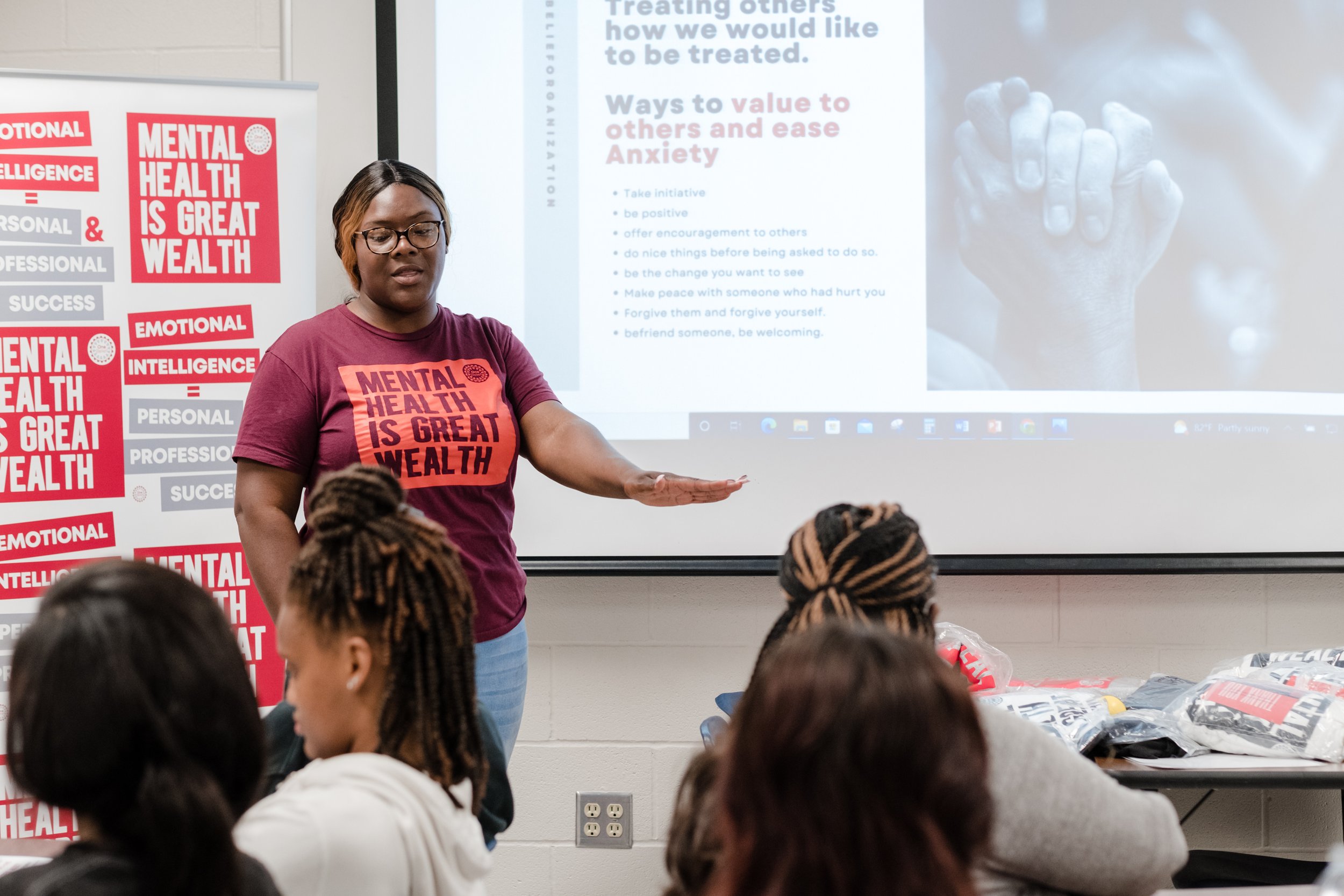
It’s no secret that youth are stressed out. Between schoolwork and extracurriculars, there are also social media and relationships, and the pressures of adulthood—it’s no wonder so many teens feel like they can’t keep up. If you’re in this phase, how would you cope?
One Belief Organization had the opportunity to speak in a small classroom setting to students in the Dallas Fort Worth Area. In an intimate setting students we able to be vulnerable and open up about things happening in the school right around them.

In the One Belief speaker sessions that we host we talk about what mental health is, we talk about knowing the signs, identifying depression, school, and life balance, knowing when to get help, positive affirmations, self-care and so much more. Students every day are going through life without having these hard conversations that educate them on emotional intelligence.
One Belief Organization schools presentations/school assemblies are about 40 minutes to an hour long during which time Tashina will speak about her childhood and transition to adulthood and the hardships endured, she talks about self-worth and knowing your worth. By the end of the presentation, students will be able to identify and understand what emotional intelligence is and how to navigate hardships emotionally.

When the world around us is constantly telling us that we’re crazy, it’s hard to find a space where we can be ourselves. But while mental health is an issue that affects all of us, youth are especially at risk.
Don’t worry. We’re here to help. And here are some tips on how to keep yourself safe:

1.) Learn to take care of yourself: It’s important to know that you have the right to take care of your body and mind as much as you want. Your body needs sleep, food, and exercise—and your mind needs rest, relaxation, and fun! Don’t let anyone tell you otherwise—it’s your life!
2.) Learn about mental health: Mental health is not just about feeling sad or feeling depressed. It involves everything from thinking negatively like self-harm to having obsessive thoughts. It’s important not just for your own happiness but also because it helps prevent other problems in your life. Because when someone has an illness like anxiety, depression, or bipolar disorder, there’s a high risk that can lead them down a path to addiction which can then lead them out of control.

3.) Make sure you have the resources: Resources such as therapy, counseling sessions, and other types of treatment where necessary like medication. This will allow them to get the help they need when needed so that they can live happy lives with no regrets later down the line!
School can be a tough place for teens to navigate. There are a lot of changes that happen when you turn 16. Transitioning from being an only child to having siblings is one of them. You might have few close friends and you feel like you don’t fit in with your classmates or teachers can also be a factor.
Whatever the reason is, it can be hard to deal with all these changes at once. It’s important to remember that you’re still growing up—and sometimes that means dealing with some tough stuff!
That’s why it’s good to know when to get help from someone who cares about your happiness and well-being so that you can stay on track with your education goals and make sure everything goes smoothly in your future.

There are many teens that struggle with depression, anxiety, and other mental health issues. It’s common for them to feel alone and ashamed of their struggles.
But that doesn’t have to be the case! Getting help is not only good for your teen—it can be good for you as well. Knowing how to spot the signs of depression and anxiety in your teen will help you both navigate the journey together.
If you feel like something isn’t right with your child, take a look at this list of things to watch out for:
1) Is your child having trouble sleeping? Or do they wake up early or go to bed late? Are they getting up during the night? If so, there might be something wrong with their sleep cycle.
2) Do you notice an increase in stress around schoolwork or extracurricular activities? This could mean that your child is feeling pressure from schoolwork or other outside sources that are causing them stress.
3) Is there an increase in crying episodes? If so, ask yourself whether this is due to sadness or anger instead of tears because sometimes kids cry over things that aren’t sad feelings.

View comments
+ Leave a comment